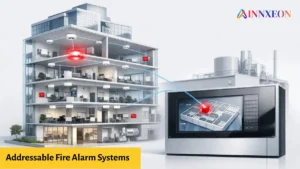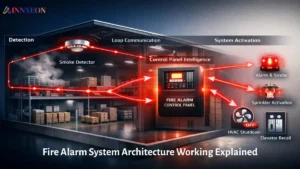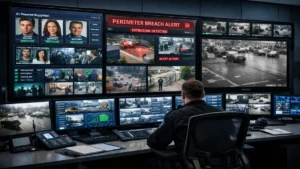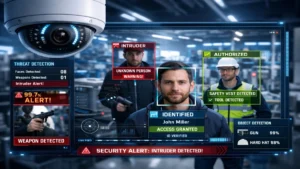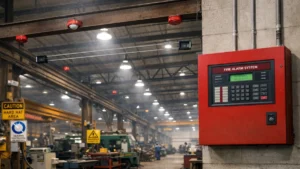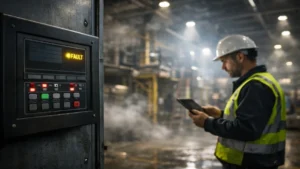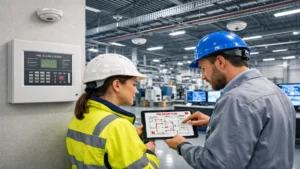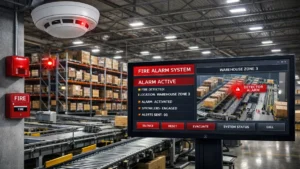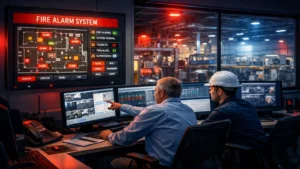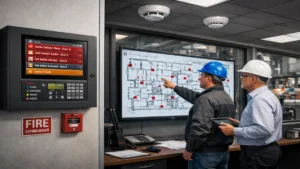Fire safety buyers today face one big question before investing in a system:
“Is this fire alarm panel compliant, certified and approved for my building type?”
And when the brand in consideration is GST Fire Alarm (Gulf Security Technology), the same question becomes even more critical, especially for consultants, system integrators, safety officers and procurement teams handling large infrastructure.
Because a fire alarm system is not just hardware.
It is a code-driven life safety commitment, bound by standards, audits, installation rules and approval authorities.
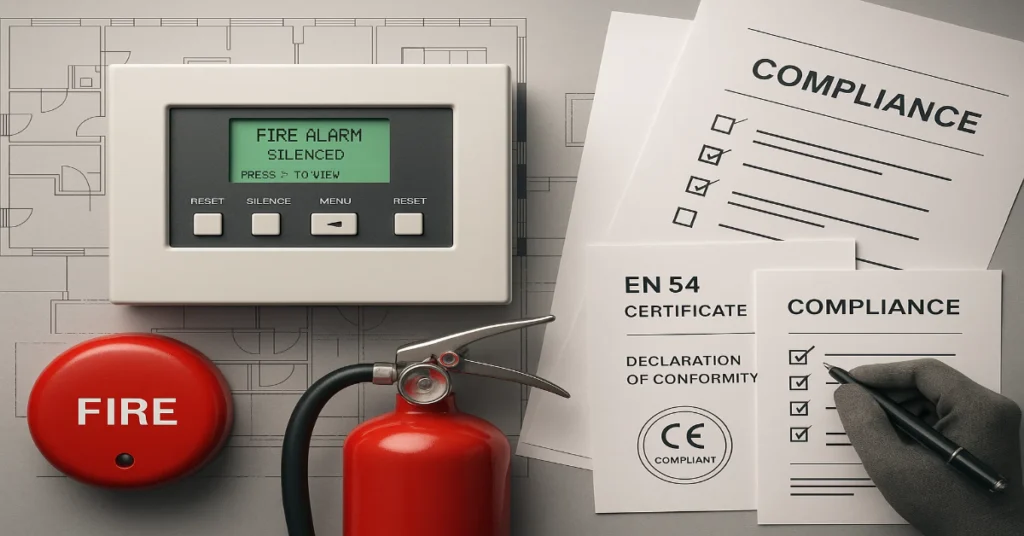
This buyer’s guide breaks everything down clearly, certifications, standards, testing, approvals, compliance mapping, installation rules, documentation checklists, real project validation and purchase filters in a simple, professional and easy-to-apply format.
Why Certification Matters More Than the Brand Name
If a fire panel fails during an inspection, audit, or emergency, the consequences are brutal:
- Occupancy certificates get blocked
- Insurance claims become invalid
- Operations receive legal penalties
- Human safety is put at risk
- Entire fire system may require replacement
Certification isn’t a stamp for marketing.
It is proof of third-party testing, reliability, survivability, safety and legal acceptance.
When buyers evaluate GST fire alarm systems, they must verify two compliance layers:
1. Product Certification
(confirms the device is tested and approved)
2. System & Installation Compliance
(confirms the alarm is engineered and installed correctly on site per code)
Understanding Fire Alarm Standards Applicable to GST Systems
1. EN 54 (European Standard for Fire Detection and Alarm Systems)
This is the most widely recognized fire alarm certification globally.
GST addressable panels, detectors and modules are commonly required to meet the following EN 54 sections:
| EN 54 Part | Covers | Why it matters |
|---|---|---|
| EN 54-2 | Control and indicating equipment (Fire Panel) | Ensures the panel processes and communicates alarms correctly |
| EN 54-4 | Power supply equipment | Confirms battery backup, charging, voltage stability |
| EN 54-7 | Smoke detectors | Validates smoke detection accuracy |
| EN 54-5 | Heat detectors | Confirms temperature sensing reliability |
| EN 54-3 | Sounders | Measures alarm audibility performance |
| EN 54-17 | Short-circuit isolators | Protects loops in fault conditions |
| EN 54-18 | Input/Output modules | Validates signal transmission to field devices |
Buyer takeaway:
If a GST device claims to be certified, it must reference a specific EN 54 category, not just “EN 54 compliant” without test evidence.
2. CE Marking (European Conformity)
CE is not a performance test, but a mandatory declaration that the product meets European safety, health and environmental requirements.
For fire alarms, CE must always exist alongside EN 54 testing.
3. LPCB (Loss Prevention Certification Board)
LPCB is one of the toughest fire testing bodies globally. Products with LPCB approval are trusted by insurers, consultants and governments.
Key benefit for buyers:
- Less false alarms
- Higher reliability score
- Better acceptance in critical infrastructure
4. UL / ULC (North American Fire Standards)
Not mandatory in all regions, but often required for:
- Data centers
- International projects
- Oil & gas facilities
- High-security buildings
5. FM Approval (Factory Mutual)
Strongly preferred in:
- Industrial environments
- Manufacturing plants
- Warehouses
- Facilities insured by FM Global
6. BIS / IS 2189 (India)
For installations in India, fire alarms must meet IS 2189:2019 guidelines for design, installation and maintenance.
Important:
- BIS does not certify fire alarm brands, it certifies processes.
- EN 54 or UL certified panels are accepted in India when installed as per IS 2189.
Approval Ecosystem That Buyers Must Understand
| Authority / Stakeholder | Role in Approval |
|---|---|
| Testing Labs (LPCB, UL, TUV, Intertek, etc.) | Certify products |
| Local Fire Departments | Approve installed systems |
| Consultants / MEP Designers | Define compliant specifications |
| Insurance Auditors | Validate risk compliance |
| AHJs (Authorities Having Jurisdiction) | Final approval to occupy |
| System Integrators | Ensure code-based deployment |
Important rule:
A certified product can still fail approval if installed incorrectly.
Critical Document Checklist Every Buyer Must Demand
Before purchasing GST fire alarm equipment, request:
- EN 54 test certificate (specific part number must match the device)
- CE declaration of conformity
- Third-party lab test reports (TUV, LPCB, UL, etc.)
- Product model traceability document
- Battery backup calculation sheet
- Voltage drop and loop loading report
- BOQ with device addressing capacity
- Compliance statement to local fire code (IS 2189 in India)
- Warranty paper from authorized distributor
- On-site training and commissioning report format
If any supplier refuses these, treat it as a red compliance flag.
5 Verification Steps Before You Buy GST Fire Alarm Panels
Step 1: Match the exact model number with the test report
Do not accept certificates that do not mention the specific model.
Step 2: Validate loop capacity vs project requirement
GST panels range from 1 loop to multi-loop enterprise models. Ensure:
- Device count
- Cable length
- Power budget
- Addressing capacity
Step 3: Confirm battery & power compliance
Power supply must satisfy:
- 24+ hours standby
- 30 minutes alarm load
(as per most fire codes)
Step 4: Check environmental suitability
Ask if devices are tested for:
- Dust resistance
- Humidity tolerance
- Temperature range
- Industrial immunity (if required)
Step 5: Confirm post-install support and AMC
Certification protects quality, but service protects performance.
Common Myths Buyers Must Stop Believing
| Myth | Truth |
|---|---|
| “GST is certified, so my project is approved automatically.” | No. The installation must also comply with codes. |
| “CE means fully fire certified.” | CE is compliance, not fire performance testing. |
| “Any cable works with addressable panels.” | Wrong. Cable type affects loop stability and must follow code. |
| “Fire NOC depends on the product brand.” | NOC depends on design + installation + testing. |
| “Cheaper panels save money.” | Non-certified systems increase long term risk and cost. |
How Certifications Impact Real-World Performance
| Without Certification | With Certification |
|---|---|
| Frequent false alarms | High detection accuracy |
| Audit failures | Smooth final inspection |
| Poor signal stability | Robust loop communication |
| Insurance rejection risk | Higher insurance acceptance |
| Unknown field behavior | Tested environmental reliability |
Who Should Buy GST Certified Systems
GST certified fire alarm solutions are ideal for:
- High-rise residential towers
- Hospitals and healthcare facilities
- Hotels and commercial complexes
- Warehouses and logistics hubs
- Educational campuses
- IT parks and office towers
- Retail malls
- Underground parking facilities
- Multi-building campuses
Final Buying Checklist
| Requirement | You must verify |
|---|---|
| Product testing | EN 54 part certificate |
| Electrical safety | CE declaration |
| Model traceability | Serial + certificate match |
| Site compliance | IS 2189 or local code |
| Power backup | 24hr + 30min alarm rule |
| Authority acceptance | AHJ or fire NOC criteria |
| Support | Commissioning + AMC |
Buying a GST fire alarm system is not just a purchase decision.
It is a compliance decision, a safety decision and a long-term risk management decision.
Certified hardware forms the foundation, but code-based design, correct installation, documentation and authority validation complete the system.
When you verify certificates, match model numbers, check installation guidelines and demand third-party proof, you don’t just buy a fire alarm.
You buy safety, approval, compliance and peace of mind.
Read Also: Why GST Panels Are the Most Budget-Friendly Choice for Multi-Building Projects
Read Also: How GST Sounder & Strobe Modules Improve Evacuation Efficiency
FAQ,s
Q: Are GST fire panels certified?
A: GST panels and field devices are tested under global standards like EN 54, CE, and additional third-party approvals depending on model and region. Always verify model-specific certificates.
Q: Is GST acceptable in India?
A: Yes, when installed as per IS 2189 and local fire authority requirements.
Q: Can certification alone get fire NOC?
A: No. Certification + compliant design + correct installation + site audit are required.
Q: Most important certificate to ask for?
A: EN 54 part-specific certificate matching the exact model, plus CE declaration.

